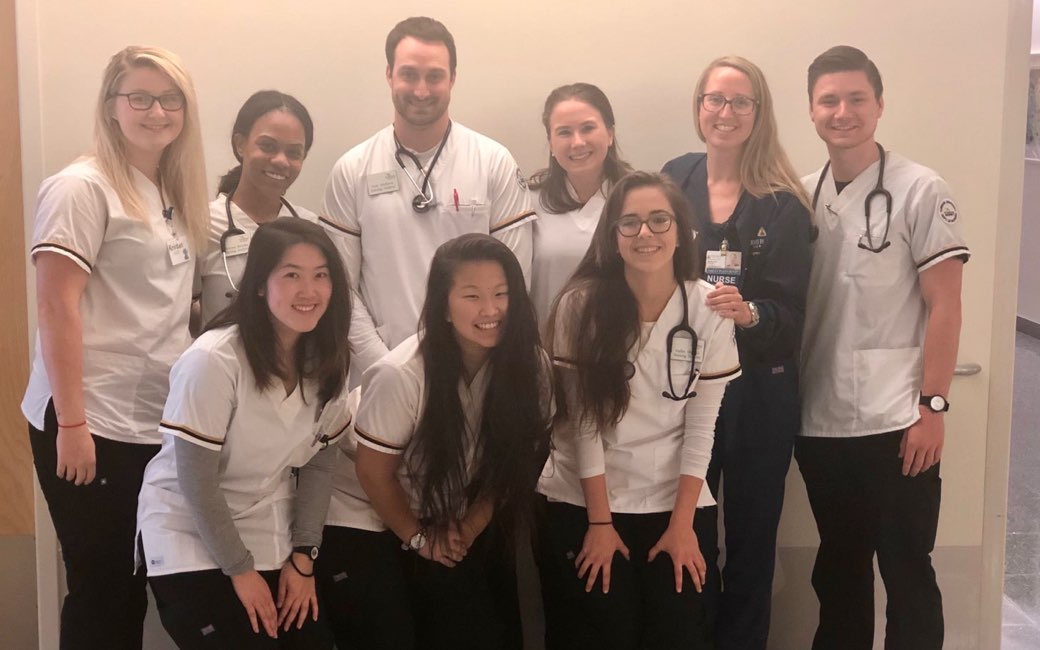Nursing students exit program early, prepared to get to work
Twenty nursing students finished their program early this year and are prepared to get to work during the COVID-19 crisis
By Cody Boteler on May 5, 2020

Towson University prepares and graduates more health care professionals than any other university in Maryland. Twenty nursing students exited their program early, ready to take on the novel coronavirus crisis.
“I couldn't be prouder of our students. We have 20 students who are graduating early and will be eligible to take jobs in hospitals as they work to address an influx of patients with COVID-19,” says Hayley Mark, chair of the Department of Nursing.
The department “has a long history of providing the nurses critical for the Maryland workforce, and that is continuing during this historic health crisis,” she added.
Those 20 students who finished early, out of a cohort of 93, is further proof that Towson University graduates are prepared to start their careers.
The students exiting the program still have to pass the National Council Licensure Examination (NCLEX), but because of the state of emergency, they can begin working as nurses right away, Mark says.
“I feel like this is what I went into the health care field for. When people are at their worst, and people need us the most to take care of them, that is what we are in this field for,” says Tyler Tuttle, who will work as an ER nurse at the Johns Hopkins Bayview Medical Center beginning this summer.
Tuttle feels like he’s been well prepared to enter the medical field at such a crucial time, he says. The faculty is able to share personal stories and current experience from working in the health care field, says Tuttle, which gives students a clear picture of what nursing looks like today.
“They didn’t treat us like they’re professors, and we’re students,” he says. “They saw us as colleague who they were interacting with.”
Tom Mellone, another nursing student exiting early and bound for an emergency room, also says he definitely feels ready because of how the faculty prepare students.
“A lot of our instructors are still working as nurses, so they’re able to relate a lot of the content to nursing practice,” he says.
Because of that practical faculty experience, TU students are prepared not only for the NCLEX—Towson University has a 90% pass rate—but to join the workforce, knowing how the fundamentals of nursing work in different clinical settings.
In the undergraduate nursing major, students spend their first two years completing prerequisite courses and their final two years immersed in the nursing-specific courses.
TU also offers degree completion programs for registered nurses or individuals who have associate’s degrees.
Nursing students earn clinical hours in some of the nation’s leading health care facilities, including The Johns Hopkins Hospital. Other partner institutions include Greater Baltimore Medical Center (GBMC) and the University System of Maryland St. Joseph’s Medical Center.
TU’s undergraduate nursing program features small class sizes, so any student can get individual attention from faculty.
“The nursing faculty that I met are people I see staying in touch with, even after graduating and working. The faculty have really made it a great experience,” says Tuttle.
Graduates heading to work in hospitals early is the latest of many ways Towson University has aided greater Baltimore during the health crisis.
Already, faculty, staff and students have donated supplies—including PPE and hospital beds, delivered food to first responders and come up with creative ways to share joy and add levity to online conversations.
This story is one of several related to President Kim Schatzel’s priorities for Towson University: TU Matters to Maryland and BTU-Partnerships at Work for Greater Baltimore.